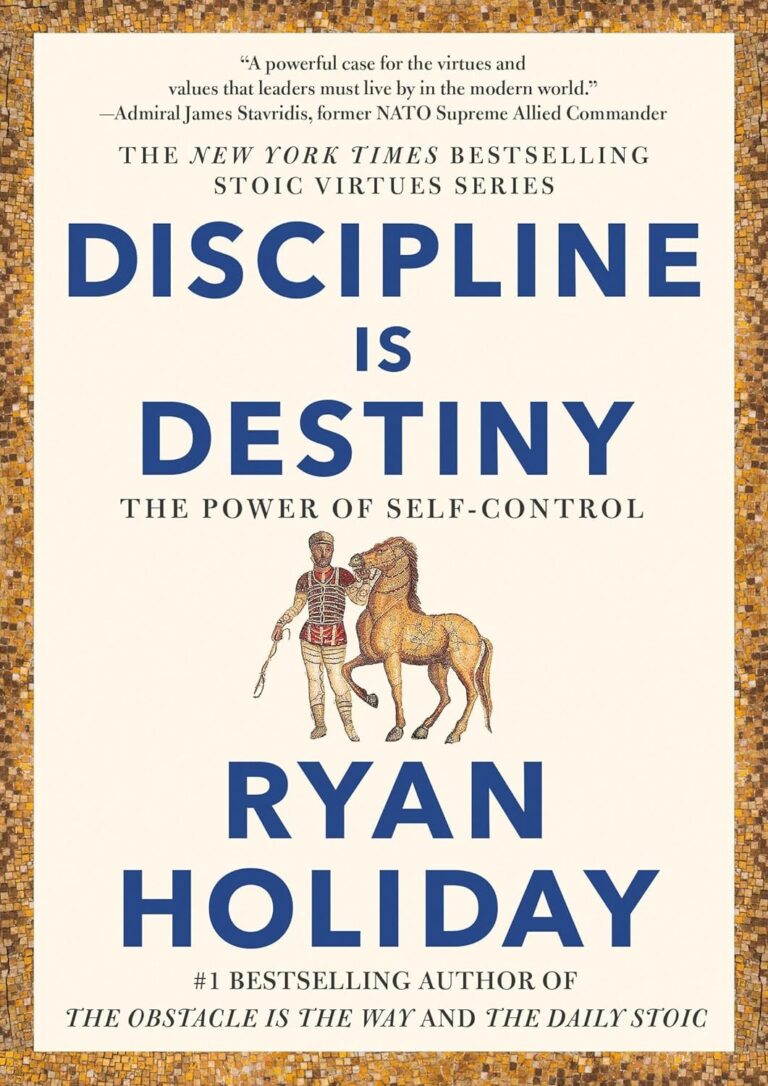
In “Discipline is Destiny,” Ryan Holiday reflects on the timeless principles of discipline and self-control as essential foundations for a successful, meaningful life. The book is part of Holiday’s series on the Stoic virtues, focusing specifically on how discipline helps shape our character, guide our actions, and ultimately define our destiny. Drawing on ancient wisdom, modern examples, and practical advice, Holiday argues that mastering discipline is the key to unlocking our true potential and living a life of purpose.
Here’s a detailed summary of the main ideas and concepts in the book.
Introduction: The Power of Discipline
Holiday opens the book by highlighting the importance of discipline as the cornerstone of personal and professional success. He stresses that discipline is not about rigid rules or punishing oneself but rather about self-mastery, learning to control impulses, emotions, and distractions in order to align your actions with your higher goals.
Holiday explains that discipline is not only about achieving external success, but it also cultivates internal peace and strength. It’s the act of consistently choosing what is right over what is easy, focusing on long-term results rather than immediate gratification. He encourages readers to think of discipline as a form of freedom, because it frees us from the chains of our weaknesses and bad habits.
Part 1: Mastering the Self
In the first section, Holiday explores the concept of self-discipline, focusing on the internal battles we all face. He argues that discipline begins with mastering the self, controlling our thoughts, emotions, and impulses in order to steer our lives in the direction we want.
1. The Internal Struggle
Holiday acknowledges that the greatest battle we face is the one within. Our minds are full of distractions, temptations, and negative thoughts that can derail us from our path. To counter this, we must develop the ability to observe our impulses and resist acting on them. He emphasizes that this internal struggle is ongoing, but with practice, we can become more aware of our thoughts and behaviors, and over time, we can win more battles than we lose.
2. Choosing Long-Term Fulfillment Over Short-Term Gratification
Holiday points out that discipline is often about choosing long-term fulfillment over short-term pleasure. We live in a world that encourages instant gratification, whether it’s social media, fast food, or binge-watching TV shows. While indulging in these behaviors may feel good in the moment, they often leave us feeling empty and disconnected in the long run.
He encourages readers to focus on actions that will lead to sustained happiness and success. Whether it’s waking up early, eating healthy, or working on a challenging project, these disciplined actions might not be immediately gratifying, but they are investments in a better future.
3. Creating Structure in Your Life
Holiday argues that one of the best ways to cultivate discipline is by creating structure and routines. Establishing daily habits, routines, and systems allows you to automate your discipline. When you have clear structures in place, you don’t have to rely on willpower alone, which is limited and can easily be depleted. Routines give you stability and a sense of control over your day.
Holiday suggests starting small with simple daily habits, such as making your bed every morning, practicing mindfulness, or setting aside time for focused work. Over time, these small habits compound and lead to larger changes in behavior and mindset.
Part 2: Discipline in Action
In the second part of the book, Holiday explores how discipline plays out in the external world. While self-discipline is crucial, it must be paired with disciplined actions that reflect your values and goals.
1. Discipline in Work and Career
Holiday emphasizes that discipline is essential to achieving excellence in any career. He references historical figures like Theodore Roosevelt, who practiced incredible self-discipline in his work ethic and commitment to public service. Holiday stresses that greatness in any field is not a result of luck or talent alone but rather the disciplined pursuit of excellence over time.
He highlights the importance of consistency, showing up every day, and doing the hard work—even when you don’t feel like it. According to Holiday, discipline is about making daily progress, no matter how small, and resisting the urge to procrastinate or take shortcuts.
2. Delayed Gratification and Focus
In a world full of distractions, Holiday argues that the ability to focus is becoming increasingly rare and valuable. He explains that true discipline involves resisting the lure of multitasking, social media, and constant notifications in order to dedicate your time and energy to deep, meaningful work.
Holiday encourages readers to practice delayed gratification by setting clear priorities and focusing on what really matters. Whether it’s building a business, writing a book, or mastering a skill, success comes from sustained focus and dedication over time.
3. Leadership and Discipline
Holiday touches on the role of discipline in leadership, noting that the most effective leaders are those who exhibit self-discipline and model it for others. He references figures like George Washington, whose disciplined leadership helped shape the United States, and Queen Elizabeth II, who remained committed to her duties for over 70 years.
Leaders must be disciplined in their decision-making, communication, and interactions with others. Holiday argues that discipline in leadership is about staying calm under pressure, making thoughtful choices, and putting the needs of the group ahead of personal gain.
Part 3: The Long Road of Discipline
In the final section, Holiday shifts focus to the long-term rewards of discipline and how it shapes your destiny over time.
1. Patience and Perseverance
Holiday emphasizes that discipline is a long game. It’s not about quick wins or immediate success; it’s about steady, consistent effort over years, even decades. He highlights the importance of patience and perseverance in achieving meaningful goals.
He reminds readers that setbacks and failures are inevitable, but disciplined individuals don’t give up—they learn, adapt, and keep moving forward. The road to success is not straight, but those who are disciplined are able to stay the course, even when it’s difficult.
2. Discipline Leads to Freedom
One of the book’s key messages is that discipline ultimately leads to freedom. This idea might seem counterintuitive—after all, discipline often involves restraint and sacrifice. But Holiday argues that by mastering discipline, we gain control over our lives and are free to pursue what truly matters.
For example, financial discipline allows us to build wealth and financial security, which leads to greater freedom of choice in our lives. Physical discipline, such as exercise and healthy eating, leads to a longer, healthier life. Emotional discipline allows us to remain calm in the face of adversity and free from the ups and downs of external circumstances.
3. Legacy of Discipline
Holiday concludes the book by encouraging readers to think about the legacy they want to leave behind. Discipline is not just about personal success—it’s about contributing to something greater than yourself. The disciplined life is one that leaves a positive mark on the world, whether through your work, your relationships, or the impact you have on others.
By embracing discipline, you shape not only your own destiny but also the world around you. Holiday invites readers to consider how they can use discipline to make lasting contributions and lead a life of meaning and purpose.
Conclusion: Discipline is Destiny
In “Discipline is Destiny,” Ryan Holiday offers a powerful argument for why discipline is the foundation of a fulfilling, successful life. Through historical examples, practical advice, and insights from Stoic philosophy, he shows that discipline is not about rigid self-denial but about mastering the self to create freedom and purpose.
The book is a call to action for readers to cultivate discipline in all areas of life, whether in their work, relationships, or personal habits. Holiday reminds us that discipline is not a trait you’re born with; it’s a skill you can develop with practice, patience, and perseverance.
By choosing discipline, you take control of your destiny and create a life of meaning, success, and lasting impact.
Let’s Keep the Growth Going
You’ve come this far for a reason. Stay connected and receive insights that meet you where you are—right in your inbox.
- Join our Newsletter -
Share:
Categories
Popular Posts
Don’t Fall in Love. Rise in Love.
Tags
Useful Links
Quick Menu
Contact Us
- +971585541780
- info@coach-g.com
- Al Murjan tower, Al Marsa Street Dubai Marina




